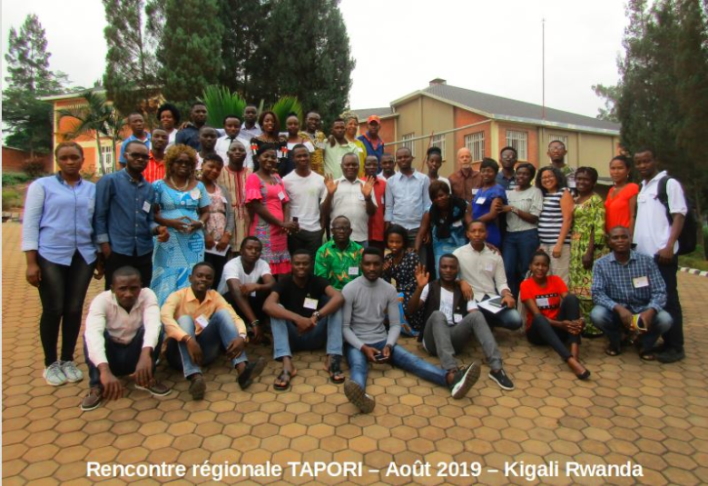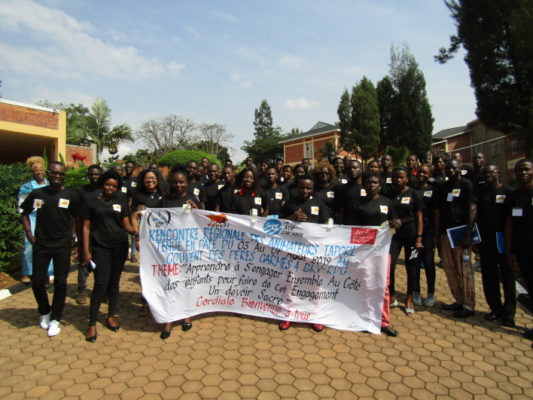African Tapori Leaders Meet in Kigali

Above: Tapori group leaders meeting in Kigali.
Last summer, about 40 Tapori group leaders from many African countries met in Kigali, Rwanda. As in many ATD projects, taking time together away from work is key to sustaining motivation, sharing best practices, and avoiding burn out in very challenging work. Commiserating, networking, training, and highlighting hopeful moments among children all provided a rich experience for the group leaders.
The Tapori leaders are all involved with ATD Fourth World in various African countries including Burkina Faso, Burundi, Cameroon, Kenya, Central African Republic, Democratic Republic of the Congo, Senegal, Tanzania, Togo, United Kingdom, Guadeloupe, Guatemala, Madagascar and Rwanda. A number are also working with other organizations focused on poverty issues in their home country.
During the meeting, the Tapori leaders discussed how they face various challenges in their work with children every day. Sharing experiences and ideas together strengthened their capacity to work with children living in very difficult circumstances and to find new ways of bringing change to their environments.
Feeling overwhelmed and discouraged
The Kigali meeting allowed the leaders of Tapori children’s groups the chance to talk in depth about why they are committed to this particular activity. But they also discussed feeling powerless sometimes when faced with the suffering experienced by the children and families they work with. Group leaders found it helpful to admit that at times they feel overwhelmed and deeply discouraged.
Tenacious hope
However, participants shared the personal sources of strength that help them get back on their feet despite tremendous challenges. Often, participants said, it is the children’s own tenacious hope that helps keep them going.
The Tapori leaders shared stories of children they know whose courage and confidence served as a source of inspiration. Such stories are often the starting point for tools like Tapori mini-books. These can help young Tapori members better understand other children’s experiences, whether they live next door or in a far off country.
Projects that work towards peace
Through the Tapori network, children think about ways they can support each other. Sometimes this means sending messages to one another. Closer to home, it can mean finding ways to improve community life, or taking a stand so no one feels excluded.
School children in the DRC organized a way for all students to take exams, whether or not they could pay the exam registration fees.
And in Central African Republic, Tapori children are working towards reconciliation of Muslim and Christian communities separated by a painful period of conflict.
How Tapori started
Joseph Wresinski, founder of ATD Fourth World, experienced the violence of poverty as a child. Thinking back on this painful time, he wondered how he had managed to grow up without losing compassion for others. The experience of struggling to survive led Wresinski to found ATD Fourth World.
Wresinski had an unshakeable confidence in children. “Only children,” he said, “are capable of grasping what is essential and marveling at what grown-ups find ugly. Children see beauty with their own eyes. We grown ups dream of beauty. Children create beauty, just in the way they look at things.”
Concerned about leaving no child behind, Joseph Wresinski created Tapori in 1967. “…The worst thing about being poor,” he said, “is to be alone, without friends, rejected and despised. You end up telling yourself that you are not like other children.
“Friendship is the most important thing you can give.”
Quickly, the Tapori network of friendship became an international phenomenon. Today Tapori groups around the world help children feel less alone and rejected because of poverty.
A long-term process
Children, Wresinski believed, with their gift for making friends and supporting one another, can make a deep and inspiring impression on adults. Tapori groups provide children an opportunity to speak out to grown ups. However, preparing young people to carry a public message is a long-term process.
Through meetings like the one in Kigali, Tapori leaders develop these skills through training and discussing what has worked for them in different contexts. They learn practical ways to give children opportunities to think about tough issues together and then feel free to speak out about their opinions.
Providing the right conditions, encouragement, and a relationship of trust are all key to these efforts. Tapori leaders learn to listen carefully and to not impose their own thoughts on the child’s expression.

Some opportunities for children to express themselves in public settings include June 16, International Day of the African Child, October 17, International Day for the Eradication of Poverty, and November 20, Anniversary of the Convention on the Rights of the Child.

